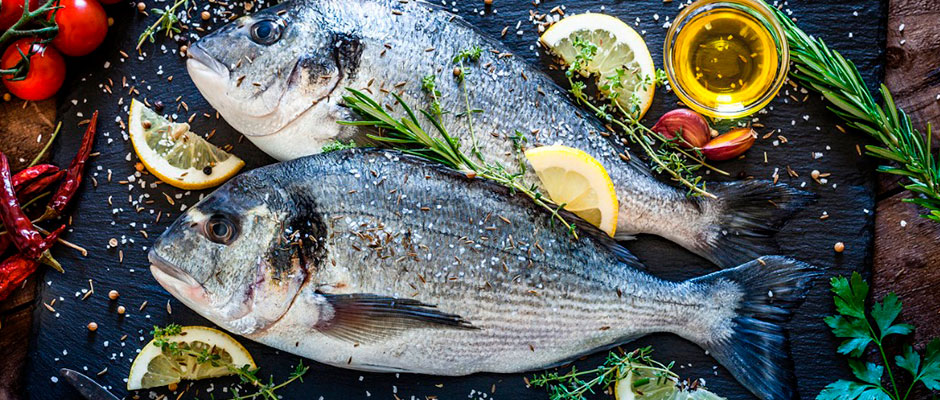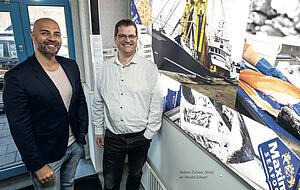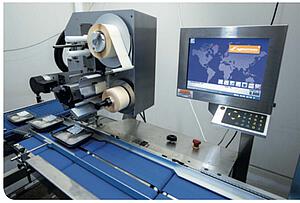

Each retailer has its specific requirement in product labelling. Starting from the position where a label has to be applied and ending with the information that have to be printed on the label. Therefore, a maximum of flexibility in labelling is required to meet current and future retail requirements. Furthermore, fast reactions and adaptions of the label design are a must.
Fish supplier Maxima Seafood’s ambition to expand to retail had existed for a while. When the request to deliver scallops came from Delhaize, the plans quickly became concrete. But this did require the necessary adjustments within their production.

All the way at the end of the quay, next to the fish auction and directly opposite the high lighthouse of IJmuiden, the largest building in the street houses fish trader Maxima Seafood. “Focused on growth”, according to Martijn Spilt, one of the three directors of the company. He talks about how three years ago, fish traders Gebroeders Bakker and Karel Hoeve IJmuiden decided to join forces: “There was a considerable overlap in our activities, but we complemented each other in terms of sales areas”. That is why we looked for new accommodation and a name that works well internationally. The company has customers in Belgium, France, Spain, Italy and far outside Europe.
Approximately 30% of the traded fish comes from the North Sea and is purchased at the nearby auction: cod, sole, plaice, monkfish and other fish species. Spilt: “We depend on what the sea gives us. Although the seasons now overlap more than they did ten years ago, the offer can still vary. For instance, in the summer, we export mackerel from the North Sea to Spain. While in the winter, we import it from Spain”. Besides mackerel, other fish is also imported, including from Iceland, Norway (salmon) and Japan (scallops). IJmuiden is a turntable in the fish trade”, says Spilt. The condition in which the fish comes in and goes out (frozen or fresh) varies. This also applies to the degree of processing. Some fish comes in whole and is filleted, portioned, packaged and labelled at Maxima Seafood. Sometimes, the fish is also processed to extend its shelf life and to guarantee food safety. In other cases, the fish is only defrosted and packaged.
Any case, processing must be done quickly, given the perishability of the product. Spilt: “We sometimes buy cod at seven AM in the morning at the auction, and it lands at the airport of Tel Aviv on that same evening”. Increasing the international market was among the growth plans of Maxima Seafood, as well as the desire to expand the sales to retail. “When the request to deliver scallops came from Delhaize, the plans were accelerated. As of early this year, we are providing Belgian supermarkets with scallops”, says Spilt. This did require the necessary adjustments. The bar was raised both in the automation and at the office. Spilt: “We have a lot of personal contact with most customers. From retail, we only communicate digitally. Orders, delivery notes, invoices; everything runs through a digital system”.

Even in the production area, an area was set up to meet the high demands of retailers. For instance, a new packaging line was installed, containing an automatic weighing and labelling machine from ESPERA (type ES5911), that is linked online to information from the ERP system of ReflexSystems. Head of ICT Ronald Schoorl explains: “We normally deliver scallops in large portions, in buckets or cans. For the consumer market, they need to be in small bins with two compartments. All codes and current details, such as the origin information, allergen declaration, nutritional value table weight and price had to be put on the labels completely and accurately.” To Schoorl, the choice for ESPERA was obvious: “For years, I prepared food processing companies for sale in retail as an ICT consultant. ESPERA was always my favourite, especially due to the good link with our ERP solution”.
Vedran Zubovic, sales advisor at ESPERA, explains:
“Our machines are modular and can therefore be modified or expanded. If the customer’s requirements change, the machines can change accordingly. For example, if the demand from the retail industry is to add an additional label on the package, the labelling system can be extended easily with an additional printing unit. Furthermore, the comfortable label design via PC enables the production team to react fast and easy according to changing design requirements coming from the retail industry.”
Schoorl is also very enthusiastic about the after sales: “If there are problems or questions about the software, someone from ESPERA can log in remotely and guide us through it. With hardware problems, a technician is at our doorstep within three hours”. Convenient, because “standstills are killing”, according to Martijn Spilt. “Retail does not tolerate hiccups.”
Service: +49 203 30540 | info@espera.com